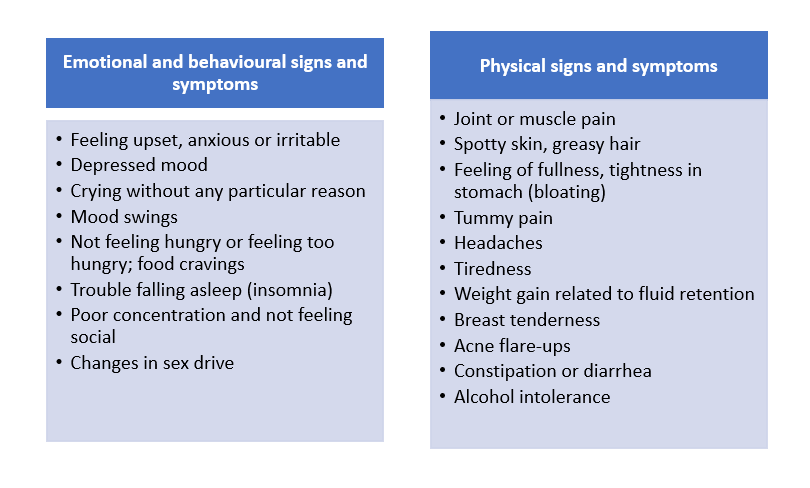CONDITIONS
Premenstrual syndrome
Premenstrual syndrome (PMS)
What are the symptoms of PMS?
Each woman is different and so are the symptoms of PMS. It can be only one symptom (from the list of symptoms) for mostly all women, but these can also change as one gets older. If a woman has any symptoms for 5 days before their period, before each period, for 3 months, it might be PMS.
The most common symptoms of PMS include:

What are the causes of PMS?
Some women are more affected by premenstrual syndrome than the others.
PMS is present in girls and women who get period. But it’s most common in:
- Women who are in the age group of late 20s to their early 40s.
- Women resuming their period sometime after having had a child.
- Women with family members with history of depression.
- Women who, in the past have had baby blues (mild form of postpartum depression), depression or bipolar disorder.
Exactly what causes premenstrual syndrome is unknown, but it is attributed to following scientific factors:
- Periodic changes in hormones
- Chemical changes in the brain
- Depression (depressions do not cause all symptoms but may cause some)
Some factors or conditions affect PMS, but they are not known to directly cause it. Those are:
- Smoking
- Lot of stress in a woman’s life, like stressful job, family issues, etc
- Lack of exercise
- Lack of enough sleep
- Drinking too much alcohol or eating too much salt, red meat, or sugar
- Depression
- Other health problems like migraine headaches, asthma, and allergies may make problems worse before period.
What can be done to manage PMS?
Do’s
- Eat a healthy, balanced diet – eating frequent smaller meals (every 2-3 hours) is better suited than eating 3 larger meals a day – it may reduce bloating.
- Make a daily habit of exercising.
- Get plenty of sleep – 7 to 8 hours is recommended.
- Try reducing stress by doing yoga or meditation.
- Keep a diary of the symptoms for at least 2 to 3 menstrual cycles –take this to the doctor so he can better assess your condition.
- Take painkillers such as ibuprofen or paracetamol to ease the pain.
Don’t
- Smoke or consume alcohol
See a doctor if:
- The above things are not working
- The symptoms are affecting daily life
The doctor can advise you the correct treatments.
How can PMS be treated?
In addition of changes to lifestyle, a doctor might recommend the following treatments:
- Medicines containing hormone – such as the combined contraceptive pill
- Counselling or talking therapy
- Antidepressants
- Dietary supplements
Some supplements such as vitamin B6, calcium and vitamin D and magnesium may also be given by the doctor. (let the doctor know in case the supplements are already taken)
Even after these treatments, if symptoms are still present, the doctor may refer a specialist.
This could be a gynaecologist, psychiatrist, or counsellor.
Premenstrual dysphoric disorder (PMDD)
A small number of women may experience more severe symptoms of PMS known as premenstrual dysphoric disorder (PMDD).
Symptoms of PMDD are like PMS but are much more intense and can have a much greater negative impact on a woman’s daily activities and quality of life. Seek help if suffering from PMDD.
References
- Traci C. Johnson, MD (Reviewer). What Is PMS? https://www.webmd.com/women/pms/what-is-pms Accessed on Nov 13 2023
- Dutta A, Sharma A. Prevalence of premenstrual syndrome and premenstrual dysphoric disorder in India: A systematic review and meta-analysis. Health Promot Perspect. 2021 May 19;11(2):161-170.
- Premenstrual syndrome (PMS) Mayo Clinic. https://www.mayoclinic.org/diseases-conditions/premenstrual-syndrome/symptoms-causes/syc-20376780 Accessed on Nov 13, 2023 Accessed on Nov 13, 2023
- PMS (premenstrual syndrome). NHS UK. https://www.nhs.uk/conditions/pre-menstrual-syndrome/ Accessed on Nov 13 2023









